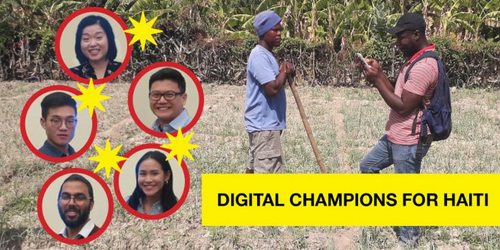
Five Columbia University students who hail from China, India, South Korea and Thailand deserve the designation ‘digital champions’ for designing a revolutionary new app to help smallholder farmers in Haiti, and eventually other parts of the world. What makes this app so unique is that it is designed to help small-scale family farmers become more productive at the same time as measuring the precise impact of each farmers’ crops on increasing food security, improving the status of women, and combatting climate change.
“We were honored to have a chance to help improve the lives of smallholders in Haiti,” said Jimmy Lee, who is graduating with a degree in Masters in Public Administration, “and we welcomed the challenge to create something innovative and impactful for SFA. The result, we believe, is quite amazing and we’re proud to have been part of this initiative.”
The students took part in this project through Columbia’s Capstone Workshopin which graduate students are required to provide a real-world consulting service which they are graded on before earning their degrees. The “client” in this case was the Smallholder Farmers Alliance(SFA), and the SFA in turn has partnered with global outdoor brand Timberlandto reintroduce cotton to Haiti after a 30-year absence. The first crop being measured is organic cotton, but the app, which began to take shape with last year’s team of Columbia Capstone students, is ultimately designed to track and measure any crop that farmers grow.
“We have now field tested a beta version of the app with 38 of our farmer members,” explained Timote Georges, Executive Director of the SFA, “and we will continue to refine and test it. While not yet in its final form, it is clear this is a breakthrough innovation for agricultural data management in Haiti.”
While the final design won’t be completed until next year, the data gathered using the app will feed in into a digital dashboard that is currently being tested. This dashboard will give precise and real time information on how individual smallholders and their families are benefiting from any given crop. It will also track the impact of that crop on food security, women’s empowerment and contribution to climate change for any combination from a single crop in one field to thousands of farmers growing that crop and spread out around Haiti.
The next step in the design process is to integrate the tree currencymodel used by the SFA. “In our system, farmers plant trees to earn credits they cash in for seed, tools and agricultural training to improve their yields and income,” said Georges, “and we are going to integrate that tree currency concept into the new app so we can track the connection between growing crops and combatting climate change.”
The SFA and Timberland are also making sure the app is ready to incorporate blockchain technology, with the proviso that blockchain remains the gold standard for building trust in the information that is collected using the app.
“Many in my generation want more information in order to make informed purchases,” said Numwa Srimontha, another of the Capstone students, “and this app can potentially help consumers of cotton or food items from Haiti know exactly what the impact of a given item is. Maybe the best way to describe it is as a kind of ‘radical transparency’ that will let consumers be part of changing the world for the better.”
Written jointly with Atlanta McIlwraith, who is Senior Manager, Community Engagement & Communications for Timberland.